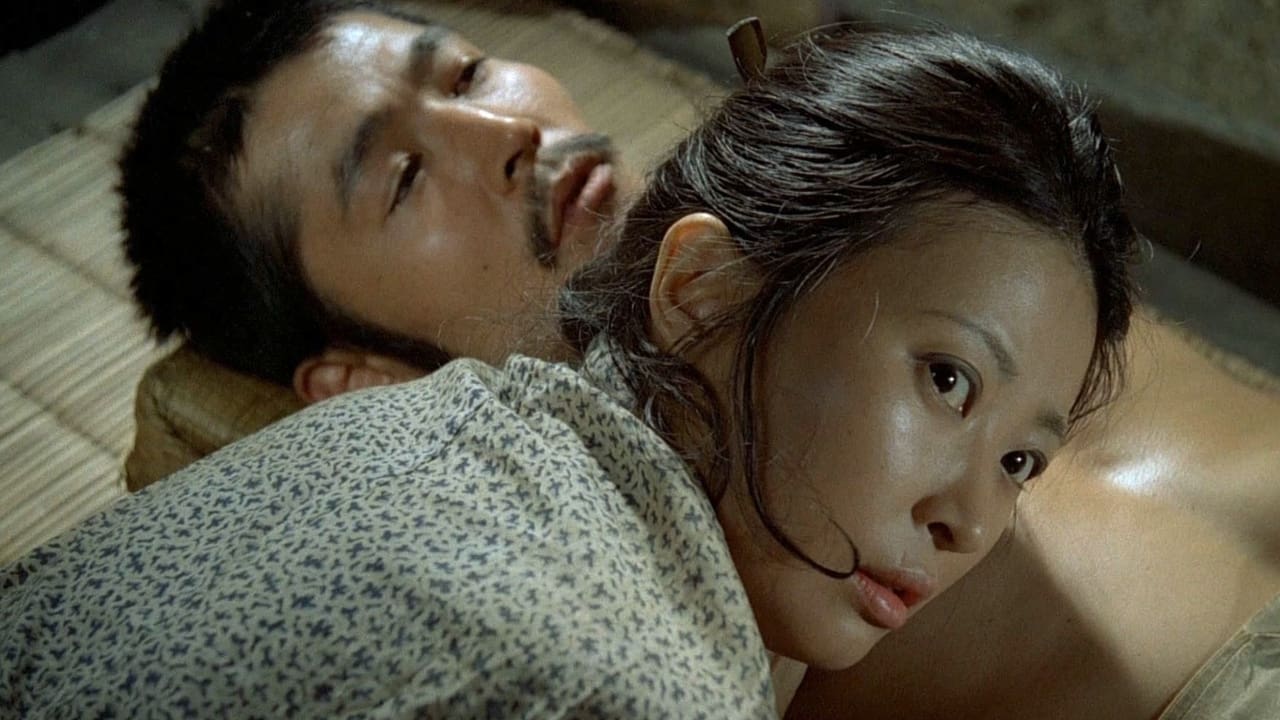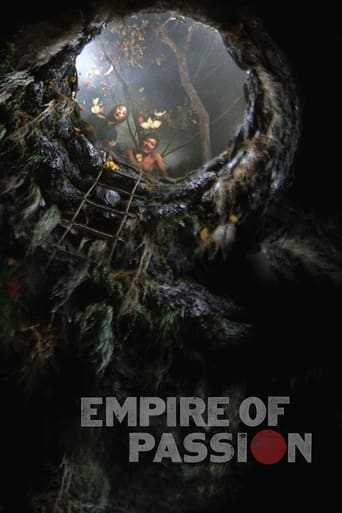

Boring, long, and too preachy.
... View MoreI like movies that are aware of what they are selling... without [any] greater aspirations than to make people laugh and that's it.
... View MoreTells a fascinating and unsettling true story, and does so well, without pretending to have all the answers.
... View MoreThis is one of the few movies I've ever seen where the whole audience broke into spontaneous, loud applause a third of the way in.
... View MoreFirst I should note that "Ai no bôrei" ("Empire of Passion" in English) is the first Nagisa Oshima movie that I've ever seen. It struck me as part horror, part drama, as the woman has an affair and then decides to kill her husband, except that he haunts her. What I wondered was whether this was an issue of guilt or grief. Whichever it was, the result is one intense movie. In the interviews with the cast members, they described the movie as a sort of extension of Oshima's previous movie "In the Realm of the Senses". Having never seen it, I can't confirm that. What I can say is that "Empire of Passion" makes outstanding use of the setting - a small village in 1890s Japan - and the characters' sexuality (there's nothing gratuitous about the nudity).All in all, I would now like very much to see "In the Realm of the Senses" and other movies by Oshima. In the meantime, I recommend this one.
... View MoreNagisa Oshima's second co-production with France, Empire of Passion (based on the manuscript of Itoko Nakamura's then-unpublished novel), is often falsely considered to be a sequel to his previous film, In the Realm of the Senses. However, despite featuring the same lead actor (Tatsuya Fuji), the two films are only loosely connected by some of the similar themes they share, making them a diptych of sorts.Empire of Passion is set in the Meiji era and, like the previous film, focuses on the nature of passionate love, or the consummation of sexuality and how it can offer an escape from the repressive outside world. However, the two protagonists in this film are doomed from the start because of this, as the fleeting sensations lead them to irreparable life choices which then take a heavy toll on their psyche. The film is much less sexually explicit than Realm, but is more disturbing and overall it's a much darker tale, with some kaidan (ghost story) elements. The appearance of a traditional Japanese depiction of a ghost fits into the whole "folktale" mood of the film, complete with a narrator voice of a creepy old lady.Unlike Realm, Empire is set in the natural world. Thus, the film is defined by seasonal shifts (it actually goes in reverse, Winter-Autumn- Summer-Spring) and the two main characters are left in mercy of the chaotic, indifferent world of nature. Some of the most beautiful shots from the movie are in fact landscapes, or seen from under a well. Toru Takemitsu's soundtrack is quite good as usual.Unfortunately, the film seemed to meander a bit, and some of the ghost scenes are pretty cheesy. The theatrical acting was a bit too much in several parts (lead actress Kazuko Yoshiyuki is beyond cute here, though) and overall, the film didn't quite click with me.
... View More"Empire of Passion" is a story of unbounded passion, crime, guilty conscience and eventual loss.The story takes place in a Japanese village in 1895. The monotonous lives of Gisaburo, the husband, and Seki, the wife, is changed forever when Seki begins an affair with a younger man, Toyojo, who convinces her that they should kill her husband to be together freely. Gisaburo's murder is the beginning of the sufferings of Seki and Toyojo, who are driven to madness in their own different ways.Director Nagisa Oshima interweaves into his horrifying story elements of Japanese culture, particularly the belief in the appearance of the ghost of dead people. In Empire of Passion, it is in fact the appearance of Gisaburo's ghost which drives the already-troubled Seki more and more towards madness, to the point where the boundary between reality and dream (or better to say nightmares) becomes blurred.Some critics said Akira Kurosawa was depicting "hell" in his 1961 Yujinbo. I believe it might as well be said the same for Empire of Passion, in its own way.
... View MoreEmpire of Passion starts out deceptively - that is, if you're immediately expecting it to be a horror movie. It's like a riff on James M. Cain's The Postman Always Rings Twice, at first: Seki (Kazuko Yoshiyuki) is a mother of two and a dutiful, hard-working wife to rickshaw driver Gisaburo (Takahiro Tamura). But when he's not around, and she's at home with the baby, the feisty and aimless young man Toyoji (Tatsuya Fuji) comes around to bring some goodies for Seki... and a little extra. They're soon sleeping together, but after he does something to her (let's just say a "shave"), he knows that he'll find out, and immediately proposes that they kill Gisaburo. They drink him up, strangle him, and then toss him down a well. Naturally, this will come back to haunt them - but that it's literally, at least to them (at first super-terrified Seki and then only later on skeptical Toyoji), changes gears into the 'Kaidan', a Japanese ghost story.This is a film where the horror comes not simply out of "oh, ghost, ah", but out of the total dread that builds for the characters. In a way there's the mechanics of a film-noir at work throughout, if only loosely translated by way of a 19th century Japanese village as opposed to an American city or small town (i.e. the snooping cop, the "evidence" found possibly by another, word getting around, suspicions aroused, etc). It's compelling because Seiko actually was against the plan from the start, manipulated by the lustful but ill-prepared Toyoji, and her reactions to Gisaburo's re-appearances are staggering to her. Take the one that comes closest to poetry: Gisaburo's ghost, pale-blue face and mostly silent, chilling stare, motions for Seiko to get on the rickshaw. She does, reluctantly, and he pushes her around on a road she doesn't know, in the wee hours before dawn, surrounded by smoke. Most Japanese ghost stories wish to heavens they could get this harrowingly atmospheric.While it starts to veer into hysterics towards the end, there's so much here that director Oshima gets right in making this a distinctive work. After hitting it huge in the international cinema world with In the Realm of the Senses (which, ironically, got banned in his own country), he made something that, he claimed, was even *more* daring that 'Senses'. Maybe he was right; Empire of Passion has less graphic sexual content by far than its predecessor (also starring Tatsuya Fuji, a magnificently physical actor with an immense lot of range), but its daring lies in crafting a world of dread. You can believe in ghosts in this story, but you also have to believe how far down to their own personal hells these two would-be lovebirds will go. The snooping detective or the gossiping townspeople are the least of their worries: the fate of their very souls is at stake.And Oshima takes what in other hands could be merely juicy pulp (sadly, it wouldn't surprise me if an American remake was already in the works) and crafts shot after gorgeous shot, with repetition working its way into the mis-en-scene (i.e. the shots of Seiko and Toyoji walking on that road, the camera at a dutch angle, the world tilted and surrounding them in a grim blue hue) as well as some affecting movements that will stay with me long after I finish typing this (i.e. Toyoji throwing the leaves by one hand into the well in slow motion, or how Seiko's nude body is revealed after she becomes blind). It's daring lies in connecting on a level of the spirit- not to be confused with the spiritual, though there may be something with that as well- about life and death's connections to one another, inextricably. It's a classic waiting to be discovered.
... View More